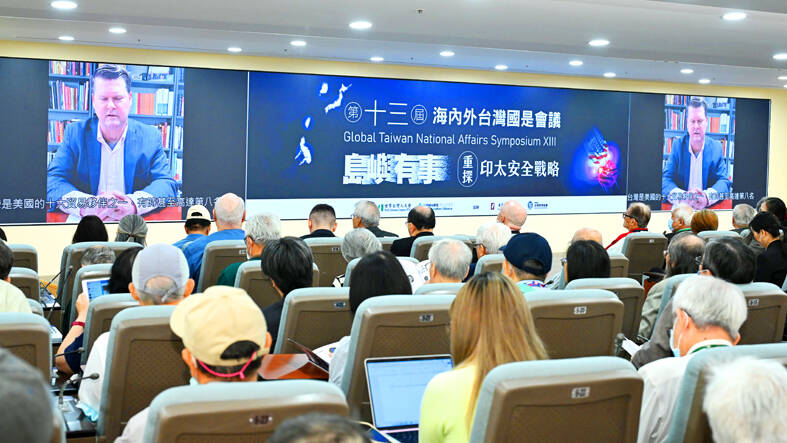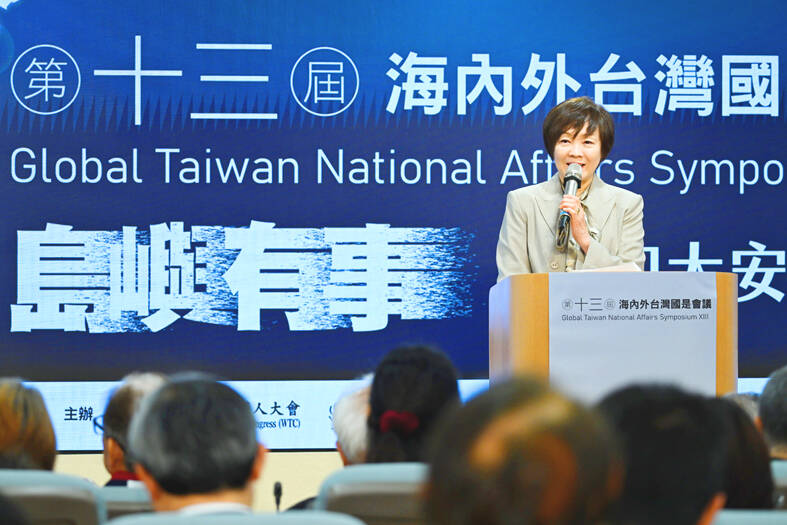Washington has reasons to consider Taiwan a critical partner and would likely continue its commitments to Indo-Pacific allies and partners, former US assistant secretary of defense for Indo-Pacific security affairs Randall Schriver told the Global Taiwan National Affairs Symposium XIII in Taipei yesterday.
Speaking via a prerecorded video, Schriver said Taiwan is one of the US’ critical partners, as it not only plays a key role in the semiconductor sector, but is also the eighth-biggest trading partner and the sixth-largest agricultural product export market to the US.
Taiwan is also the second-largest buyer of US arms, he said, adding that the two countries’ ties are built on common values and interests.

Photo: Chen Yi-kuan, Taipei Times
Given that Taiwan is at the center of the Indo-Pacific region, it is indispensable to countries upholding the free and open Indo-Pacific order such as the US, Japan and the Philippines, he said.
It is understandable that people doubt that US commitments to Indo-Pacific partners would continue or they question whether such partnerships are valued by US President Donald Trump, he said.
Schriver said he would be cautiously optimistic about the situation, considering recent developments.

Photo: Chen Yi-kuan, Taipei Times
Officials of the US departments of defense and state expressed support for the US-Japan-Philippines cooperation and the reinforcement of the Quadrilateral Security Dialogue, he said.
They also visited the Indo-Pacific region and the US Indo-Pacific Command, he said.
These moves demonstrated the US’ continued investments in its Indo-Pacific allies and regional security, he added.
Schriver expressed concern over Washington’s cuts in foreign aid and the suspension of funding for the US Department of State’s overseas scholarships and exchange programs such as the Fulbright program.
Such soft-power tools should be resumed, as they are important in countering China’s psychological warfare in the Indo-Pacific region, he said.
Taiwan should also take more responsibilities, he said.
The nation should strengthen its self-defense capabilities and develop infrastructure resilience — especially in telecommunications and energy, Schriver said.
Taiwan should also try to lessen its trade surplus with the US by increasing its investments there to stabilize bilateral ties, he said.
Taiwan should also continue protecting submarine communications cables, addressing climate change and assisting infrastructure developments of Pacific island countries, he said.
The US’ goal is to buy more time by maintaining deterrence in the Indo-Pacific region, prompting China to reconsider its Taiwan policy, he said.
Taiwan’s future should be decided by Taiwanese, he said.
Meanwhile, Akie Abe, the widow of former Japanese prime minister Shinzo Abe, told the symposium that her late husband “loved Japan, loved Taiwan, and was one of the people most keen for regional peace.”
“My husband once said that ‘a Taiwan emergency is a Japan emergency,’ which I would understand as ‘peace in Taiwan is peace in Japan,’” she said.
Shinzo Abe admired Taiwanese values he learned from former president Lee Teng-hui (李登輝), she said.
She said while some lamented Shinzo Abe’s and Lee’s passing as “the loss of two engines driving the Japan-Taiwan relationship,” she thought differently.
Akie Abe said she is close with Lee’s daughter, Annie Lee (李安妮), who is also the chairwoman of the Lee Teng-hui Foundation, and together they would continue Shinzo Abe and Lee Teng-hui’s efforts to deepen bilateral ties.
The symposium was co-organized by the World Taiwanese Congress and the Taiwan Nation Alliance, and focused on issues relating to Indo-Pacific security strategies and the trilateral security cooperation between Taiwan, the US and Japan.

Taiwan is stepping up plans to create self-sufficient supply chains for combat drones and increase foreign orders from the US to counter China’s numerical superiority, a defense official said on Saturday. Commenting on condition of anonymity, the official said the nation’s armed forces are in agreement with US Admiral Samuel Paparo’s assessment that Taiwan’s military must be prepared to turn the nation’s waters into a “hellscape” for the Chinese People’s Liberation Army (PLA). Paparo, the commander of the US Indo-Pacific Command, reiterated the concept during a Congressional hearing in Washington on Wednesday. He first coined the term in a security conference last

Prosecutors today declined to say who was questioned regarding alleged forgery on petitions to recall Democratic Progressive Party (DPP) legislators, after Chinese-language media earlier reported that members of the Chinese Nationalist Party (KMT) Youth League were brought in for questioning. The Ministry of Justice Investigation Bureau confirmed that two people had been questioned, but did not disclose any further information about the ongoing investigation. KMT Youth League members Lee Hsiao-liang (李孝亮) and Liu Szu-yin (劉思吟) — who are leading the effort to recall DPP caucus chief executive Rosalia Wu (吳思瑤) and Legislator Wu Pei-yi (吳沛憶) — both posted on Facebook saying: “I

The Ministry of Economic Affairs has fined Taobao NT$1.2 million (US$36,912) for advertisements that exceed its approved business scope, requiring the Chinese e-commerce platform to make corrections in the first half of this year or its license may be revoked. Lawmakers have called for stricter enforcement of Chinese e-commerce platforms and measures to prevent China from laundering its goods through Taiwan in response to US President Donald Trump’s heavy tariffs on China. The Legislative Yuan’s Finance Committee met today to discuss policies to prevent China from dumping goods in Taiwan, inviting government agencies to report. Democratic Progressive Party Legislator Kuo Kuo-wen (郭國文) said

The Ministry of Economic Affairs has fined Taobao NT$1.2 million (US$36,900) for advertisements that exceeded its approved business scope and ordered the Chinese e-commerce platform to make corrections in the first half of this year or its license would be revoked. Lawmakers have called for stricter supervision of Chinese e-commerce platforms and more stringent measures to prevent China from laundering its goods through Taiwan as US President Donald Trump’s administration cracks down on origin laundering. The legislature’s Finance Committee yesterday met to discuss policies to prevent China from dumping goods in Taiwan, inviting government agencies to report on the matter. Democratic Progressive Party